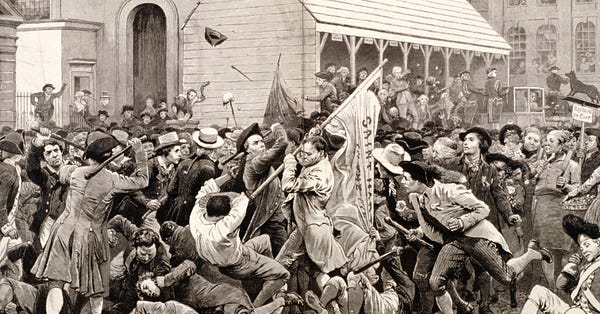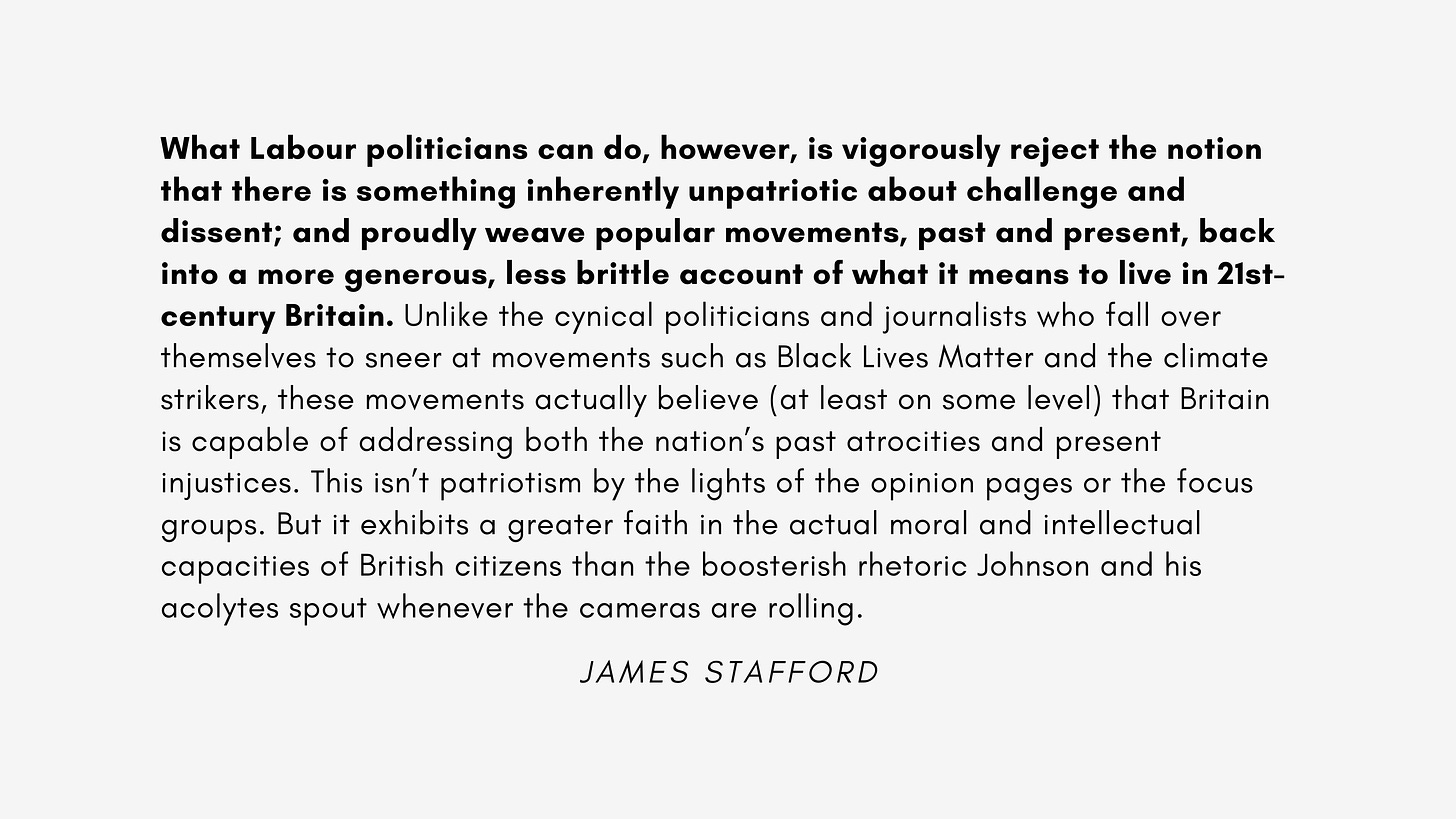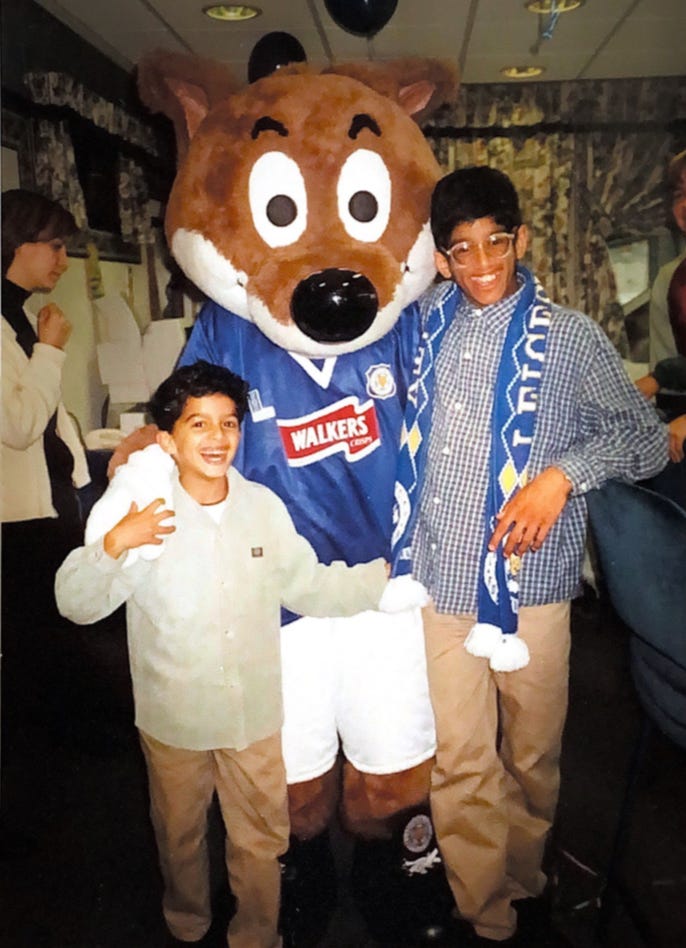The Greatest Sporting Miracle
Remembering the best days of my life. How to disagree. And some stuff on culture wars and football.
Hi friends 👋🏽 ,
Welcome back to Between Black and White, a monthly newsletter that challenges binary thinking by embracing complexity, with a focus on politics and society.
Football had a bit of a moment this past month, jumping from the back pages to the front pages, when twelve of Europe’s biggest clubs announced their intention to form a breakaway European Super League. The episode showcased the rampant capitalism that is now interwoven into football’s DNA.
So at a moment when football’s ugly side is on parade, I thought I’d write about what football means to me.
Five years ago, my football team, Leicester City won the English Premier League. It’s regarded as the greatest sporting underdog story ever. Famously, the bookmakers odds of us winning the league were 5000/1 - supposedly the longest odds ever paid out on a single event, in any genre, ever.
This is my story of what it was like to be a fan that season. And ultimately, it’s a story about what football can be at its best.
You can read the piece below or click here to read it directly on my website.
Today, I’m also sharing a medley of my latest thinking on disagreement, culture wars and why football matters. I’m also debuting my micro-video series, “One Word Conversations.”
As ever, do get in touch if you have any thoughts. I love hearing from you.
Sunil
Things I’m Thinking About
How to Disagree (Online)
Last month, I wrote about futarchy, a form of governance where speculative markets are used to decide what policies to adopt. Unexpectedly, the creator of futarchy, economist Robin Hanson, took issue with what I wrote and penned a rebuttal.
If I’m honest, it unnerved me! I realised that I’m more uncomfortable with disagreement - especially in public - than I’d originally thought. Why? Well for one, I’m a people pleaser. But I also think our “on the one hand X, on the other hand Y” education systems discourage bravery of thought.
We need to get better at disagreeing - even seeing it as a skill to nurture, as Ian Leslie has argued. This is why I love writing so much. It instills an existential humility as gaps in your thinking are continually revealed. And like an archaeologist gently dusting off their find, the very act of writing gradually unveils your own perspective.
So this was a good experience. I got to practice how to disagree online. Check out the whole thread by clicking 👇🏾


Do Culture Wars Matter? And What Really Shapes Our Culture?
I’ve been doing some more thinking in public about culture wars prompted by an article by Dominic Sandbrook. He argues that far from being a distraction, culture wars are in fact, “the substance of politics, and always have been.”
It was a take that made me reflect on an observation that I made in the last edition of this newsletter. Namely that, "so much of the controversy in our politics seems to be needlessly manufactured at the moment."
You can check out my work in progress thinking by clicking 👇🏾


As soon as I wrote this thread, James Stafford penned a brilliant article, “The idea that Labour lacks patriotism is nearly as old as the party itself.” It does a good job of reframing how criticisms of the UK actually reflect a deep-seated belief and optimism in this country’s ability to renew itself:
Mirror, Mirror, On The Wall — Who's The Fairest Of Them All? Clue: Not Football
If you care to look, football is the closest thing we have to collective mirror - revealing the cultural, economic and political anxieties, contradictions and fault-lines that exist in our country.
And just like the magic mirror in Snow White that tells the Evil Queen unpalatable truths that she cannot bear to hear, when we look, we don’t always like our reflection.
At first glance, it’s a positive image, with accolades raining down on the English Premier League. The most watched league. The most valuable league. An all-English Champions League final. And it’s cosmopolitan, with sixty-two different nationalities represented amongst players and the best managers from around the world.
But take a closer look.
Eighteen out of twenty English Premier League clubs are now owned by billionaires. The result is that most football clubs are consigned to a perpetual Never Never Land, where they have no hope of reaching the top because they don’t have the resources. And even fans of these wealthier clubs are unhappy, with questions abounding about who their clubs truly belong to. Technology in the form of “video assistant referees” (VAR) is also dramatically changing the game beyond recognition.
So for all of the success, we’ve ended up with a national game where many fans feel the odds are rigged against their team, while others feel detached from the clubs they support.
Football’s current malaise matters.
For vast swathes of the population, it brings concerns about how capitalism, globalisation and technology work to life with a viscerality and immediacy that can be lacking in other spheres of life.
Things I’ve Read
I’ve started doing roundups of articles I’ve read and enjoyed. Click on the tweet below to check them out 👇🏾

Video of The Month
Ok. I cheated. This is a shameless self-promotion. I’ve been learning how to make videos and I’ve started a new series called “One Word Conversations.” I’ve noticed I rarely watch videos till the end, so these are micro videos in which I share personal reflections prompted by a single word. According to psychologist Adam Grant, “languishing is a sense of stagnation and emptiness.” It resonated with me when I read about it. If you are intrigued, check out Austin Kleon’s brilliant rebuttal, “I’m Not Languishing. I’m Dormant.”
I also made a video about “ Remembering.” I ask: what happens to grief when the lockdowns end? You can check it out here.
Remembering The Greatest Sporting Miracle
I know what it’s like to experience a miracle.
It happened on May 2nd, 2016 at Stamford Bridge in West London.
Chelsea were playing their arch-rivals Tottenham. Second place Tottenham needed to win to prevent my team, Leicester City, from winning the Premier League.
I hadn’t actually planned on watching the game live especially given Leicester weren’t actually playing. But by coincidence, I was going to dinner round the corner from Stamford Bridge, where the game was being played.
My friend was puzzled. “Why aren’t you going to the game? It’s the biggest game in your club’s history!”
It wasn’t a hard argument to resist and I soon found myself walking down Fulham Road asking people randomly if they knew where I could buy tickets.
Before long, I was ushered to a street corner where I told two men I wanted one ticket for the game.
“How much money to do you have?” one of them said.
“£100,” I replied.
“Not a chance! This is a big game. Tickets are £150, £200.”
I imagine I looked somewhat disappointed because one of them spoke. “Why should we sell you a ticket at that price?”
I shuffled nervously for a few seconds before opening my jacket and revealing the Leicester City shirt that was underneath.
Now knowing my allegiance they smiled, snatched my £100, and within seconds I was being marched towards the stadium.
“Today, we’re all Leicester City fans,” one of them beamed.
As I was taken into the stadium I was somewhat nervous to see my seats were in the Shed End. I was sandwiched between Chelsea fans, who had no love for Leicester City (and vice-versa), and Tottenham fans, who, at least for this evening, were the sworn enemy.
My shirt was once again hidden away beneath my jacket. My neighbours knew though and gently smiled.
This was it!
After 22 years of being a Leicester City fan. I was within touching distance of the greatest moment of my life as a football fan. No matter how many years came after, this was undoubtedly going to be the pinnacle.
Except it didn’t quite go like that.
The half hour mark came and Harry Kane opened the scoring for Tottenham. And then just before half-time Son Heung-Min tapped in a second.
The footballing gods had grabbed the remote control and pressed pause.
I started thinking ahead to Leicester’s game at Everton. That would be where the most unlikely title race in history would be decided.
I justified the turn of events: perhaps it was right that we were meant to win the title on our home turf and because of our own actions.
But my racing mind was stopped by the arrival of the second half.
It was a feisty match. It seemed like every few minutes players were squaring off with one another. So much so that the game actually became known as “The Battle of Stamford Bridge.” The stats bear this out. An incredible 12 yellow cards were dished out compared to the average of just over one per game.
The first sign the miracle was back on the cards came around the fifty-eight minute mark. Chelsea’s defender Gary Cahill stabbed home Chelsea’s first goal during a corner. To slightly paraphrase Gandalf, hope was kindled.
Chelsea were in the ascendancy.
At this point, my neighbour told me not to worry and take off my jacket to reveal my Leicester shirt.
A kind interpretation is that they wanted me to feel free to express my footballing identity. The other interpretation is that I had become an unofficial mascot, a tool to wind up the Spurs fans sitting only metres away.
Five years later, what lingers in my mind is the silkiness of Eden Hazard.
At 21:44, I remember him dancing past three Spurs players near the halfway line, laying off the ball and improbably ending up in space just in front of their box.
He charges into the box anticipating the ball. As it comes towards him, he winds his right foot back at an angle before striking the ball.
Everything about his movement is the embodiment of footballing perfection.
The ball spins into the top right hand corner of the Spurs goal.
Cue pandemonium.
I don’t actually even put my arms in the air in celebration. Instead a lot of grown men jump on me. My glasses are on the floor somewhere.
I’m helped to my feet and everyone is shaking my hand, smiling. It’s almost as if for these few minutes I’ve become a proxy for the entirety of Leicester City.
People are shaking my hands. Taking pictures with me. They sing, “there’s only one Ranieri,” in honour of Leicester’s soon-to-be title-winning manager who once led Chelsea.
Near the end, I’m hoisted on to someone’s shoulders. Everyone around me sings and points, “Leicester City we’ll win it for you.”
Even though they aren’t singing my name, basking in the warmth of the crowd, I imagine this is what dictators and gladiators of time past must have felt like when they are feted.
After the game, I’m continually mobbed as I walk back to my friend’s house. Another Leicester fan at the game runs into me screaming with joy. I also collide into some unhappy Spurs fans. But before anything happens, a bunch of Chelsea fans have formed a protective phalanx around me.
First, the impossible became possible. And, that night, the possible happened.
The team I started supporting aged four years old after my uncle took me to my first Leicester City game have won the Premier League.





